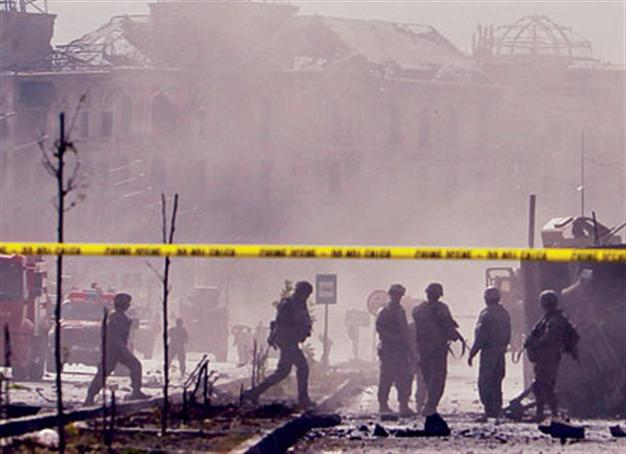
A NATO helicopter flies over the site of a bomb blast in Kabul Oct. 29. A Taliban car bomber struck a NATO military convoy in Kabul on Saturday, killing 17 people, including 13 US troops, in the deadliest attack to hit Afghanistan in months. It was the deadliest incident in the more than 10-year war since the Taliban apparently shot down a US helicopter in August, killing 30 American troops. REUTERS photo.
The first of two conferences on the fate of international involvement in Afghanistan will be held in Istanbul on Nov. 2 but Western officials are pessimistic about finding a successful solution for the country, where 20 people were killed over the weekend.
Afghan President Hamid Karzai and Pakistani President Asif Ali Zardari will hold a tripartite meeting with their Turkish counterpart Abdullah Gül tomorrow on the eve of the Afghanistan meeting attended by more than 20 foreign ministers.
U.S. Secretary of State Hillary Clinton will travel to Istanbul on Nov. 2 to attend the conference hosted by Turkish Foreign Minister Ahmet Davutoğlu.
“The conference will be co-chaired by Afghanistan and Turkey and will include Afghanistan’s neighbors and other key regional partners,” U.S. State Department Spokesperson Victoria Nuland said in a written statement on Oct. 27.
The government and its foreign backers are planning to have all foreign troops withdrawn by the end of 2014 even though some foreign troops will remain as trainers and advisers. Some Afghans fear their own security forces will be unable to cope with the insurgency when the majority of foreign troops go and that their country may fall into another civil war.
Meanwhile, attacks against Western forces in Afghanistan continued over the weekend. A Taliban suicide bomber rammed a vehicle loaded with explosives into an armored NATO bus at a busy thoroughfare in Kabul, killing 17 people, including four Afghans, in the deadliest strike against the U.S.-led coalition in Kabul since the war began.
NATO said five of its service members and eight civilian contractors working for the coalition died in the attack. A U.S. defense official said all 13 were Americans. However, Lt. Col. Christian Lemay, a Canadian defense spokesman, said one Canadian soldier was among the troops killed.
A spokesman for Taliban, which was ousted in the 2001 invasion for its affiliation with al-Qaeda, claimed responsibility for the Kabul attack.
Also on Oct. 29, a rogue Afghan soldier killed three Australian soldiers and wounded seven. Australian Prime Minister Julia Gillard on Oct. 29 defended her country’s involvement in Afghanistan after the killings. Meanwhile, a teenage girl also blew herself up as she tried to attack an Afghan intelligence office in the capital of Kunar province, a hotbed of militancy in northeast Afghanistan along the Pakistan border, the coalition said. Abdul Sabor Allayar, deputy provincial police chief, said the guards outside the government’s intelligence office in Asad Abad became suspicious and started shooting, at which point the bomber detonated her explosives, killing herself and wounding several intelligence employees.
Talks in Turkey on Nov. 2 aim to reach agreement on a framework for regional security and cooperation, including Afghan border nations Pakistan, Iran, China, Turkmenistan, Tajikistan and Uzbekistan, ahead of a more expansive meeting in Germany in December. Some participants already have low expectations.
“If they agree on the roadmap leading toward a meaningful regional security dialogue and application of security-building measures on a regional level, that will be a success by itself,” a senior Western official said. “[There are] low expectations, but if they launch the process, it will be a success.” Afghanistan, which argues that militancy and drug trafficking are cross-border problems that need cross-border solutions, wanted legally binding security commitments to be made in Istanbul. Kabul has since had to concede only a non-binding, diluted agreement would be possible.
“Regional cooperation is crucial not just for achieving long-desired security, stability and prosperity for the people of Afghanistan, but also in the wider region,” said Afghan deputy foreign minister Jawed Ludin, addressing diplomats before closed-door talks in the Istanbul meeting. “The Afghans have had to lower their ambitions a bit in the face of some regional objections,” a second senior Western official said. Rather than aim high and fail, those involved in the talks have settled for modest goals that are easier to reach.
Regional heavyweight Pakistan would be crucial to any cross-border security initiative but it is also harboring modest ambitions. “We envisage this conference as a platform to express the region’s solidarity and support for Afghanistan in its endeavors to establish peace and stability,” Pakistani Foreign Ministry spokeswoman Tehmina Janjua said.
Compiled from Reuter and AP stories by the Daily News staff.